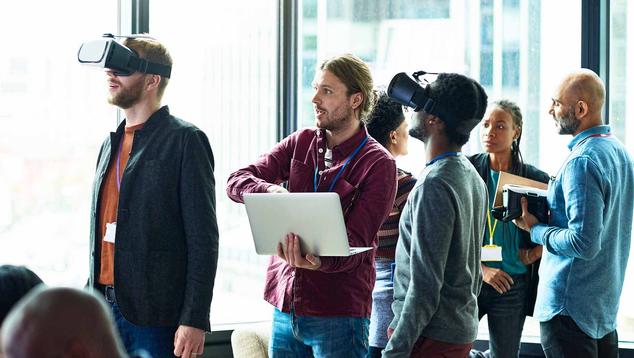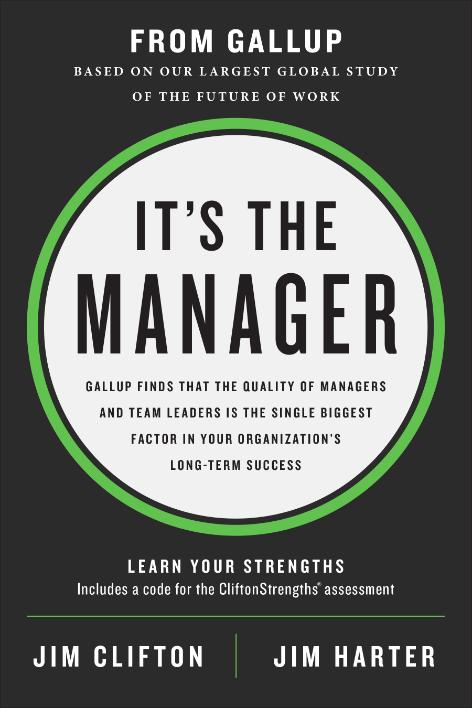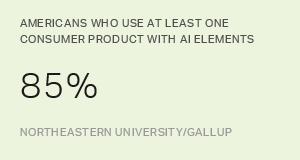Story Highlights
- AH may help leaders use human traits more effectively for business outcomes
- Leaders will need exceptional judgment to empathize and understand more
- Leaders will need to master several new competencies
According to Gallup research, more than three in four Americans (76%) "agree" or "strongly agree" that artificial intelligence (AI) will fundamentally change the way people will work and live over the next decade.
No need to wait -- augmented humanity (AH) is the next gen application of AI, and it's already here. Consider the music service that monitors your heartrate via sensor and then selects the next track to soothe your mind or activity trackers that remind you when it's time to head to bed. Soon, the market will see exoskeletons allowing those who have been paralyzed to walk and contact lenses that are able to detect blood glucose levels for diabetics.
These products all used to be the stuff of science fiction.
But as AH gets better, science fiction becomes less fictional -- and the probability of an "augmented leader" is growing closer all the time.
AH will change leadership, but it will never replace leaders.
The augmented leader is not a human-robot hybrid. (Not yet, anyway.) Rather, leadership augmentation is technology that enables leaders to make fast, sophisticated, data-driven decisions that direct workers' activities in partnership networks, not through chains of command.
Consider the universal language translator. Already on the market, this kind of augmentation helps managers communicate directly, make informed decisions and drive higher performance outcomes from increasingly diverse, widespread and complex teams.
But as AH gets better, science fiction becomes less fictional -- and the probability of an "augmented leader" is growing closer all the time.
But it won't necessarily make them better at understanding employee's strengths, aspirations and values. And the ability to make good AI-enhanced decisions will depend on such leadership capacities.
Leadership competencies and workplace culture are critical in the augmented future of work.
As McKinsey put it in a recent report, "The hardest activities to automate with currently available technologies are those that involve managing and developing people (9% automation potential) or that apply expertise to decision-making, planning or creative work (18%)."
Gallup recently studied 550 roles and 360 unique competencies to identify the most essential organizational competencies required for achieving excellence in any role. Seven stood out -- building relationships, developing people, leading change, inspiring others, thinking critically, communicating clearly and creating accountability.
These are human capabilities. AH will enhance them but will not replace them. Neither can AH replace a leader's creativity, strengths, aspirations, values or ability to make sense of experience. But AI will augment those qualities and help leaders use them more effectively to achieve business outcomes.
Take, for instance, virtual meeting rooms (VRMs) and augmented reality (AR). This tech allows teams to interact, interface and co-create simultaneously, erasing geographical barriers. Many companies, Accenture among them, already use virtual reality (VR) tech for recruiting to eliminate logistical problems, reduce hiring bias, and accelerate the process. Microsoft's HoloLens, a VR headset, allows users to instinctually manipulate, design and create while interacting with remote teams.
Using this kind of technology, leaders could work with their teams to test supply chain enhancements or find fail points on an AR-driven customer journey map, with AI producing the data they need in a flash.
But unifying people who never see each other on behalf of a hypothetical customer living in an imagined future -- and doing it so well that workers can picture the vision clear as day -- is a leadership quality. And soon it will be a leadership requirement.
Orchestrating the efforts of hybrid teams will place demands on leaders' relationship building, communication, critical thinking, and visioning competencies the likes of which they have not yet experienced.
This future informed by AH will affect work teams, too. Teams will be comprised of employees, gig-workers and machines working side by side. And the workplace itself will be different. The way teams interact virtually will affect organizational culture, values and ways of working. Systems of accountability and development will have to reflect that new reality.
Leaders will have an important role to play in ensuring that augmentation and technology do not corrode culture. And that the physical distance between team members does not lead to separation. Orchestrating the efforts of hybrid teams will place demands on leaders' relationship building, communication, critical thinking, and visioning competencies the likes of which they have not yet experienced.
Identify key leadership principles that will contribute to success in our augmented future.
AI and AH can help, but they can't replace human cognitive functions or the emotional-social interaction. And as our ability to communicate improves, a single unifying purpose that guides the organization's efforts will become ever more important.
Perhaps economist Klaus Schwab, founder of the World Economic Forum (WEF), said it the best.
"We need leaders who are emotionally intelligent, and able to model and champion cooperative working. They'll coach, rather than command; they'll be driven by empathy, not ego. The digital revolution needs a different, more human kind of leadership."
Companies need to identify the important competencies required of their leadership team. And then they need to intentionally guide leaders to help discover which of their strengths and talents will truly aid in efforts to increase performance and enhance business outcomes.
These human attributes are, indeed, the ones that will help leaders achieve success. They always have been. But as tech gets better, cheaper and more accessible, the things humans can do that machines can't will only become more valuable.
Best to further develop those human qualities now, because the future is already here.
Learn more about leading with humanity in the era of AI:
- Partner with us to create a culture energized by empathy and cooperation.
- Purchase your copy of the Amazon bestseller, It's the Manager, to get Gallup's breakthrough management advice and learn how to prepare your workplace for AI.



